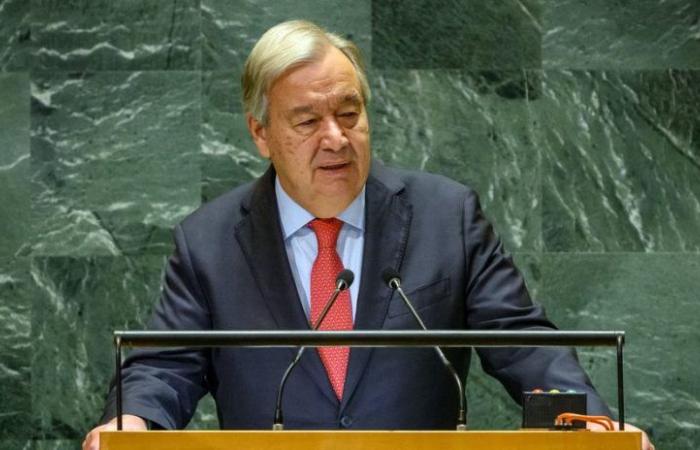While the world is “a powder keg”, the Secretary-General of the UN, António Guterres, called on Tuesday not to give up and to meet the challenges by fighting against impunity, inequalities and uncertainty, to the opening of the general debate of the United Nations General Assembly in New York.
“The state our world is in is unsustainable. We cannot continue like this,” said the UN chief in a speech delivered from the podium of the General Assembly.
According to him, it is possible to meet the challenges we face, but to do so, we must ensure that the mechanisms for resolving international problems actually make it possible to resolve the problems.
The Future Summit, which took place just before the debate on September 22 and 23, “is a first step, but there is still a long way to go,” he said.
Impunity, inequality and uncertainty
According to the Secretary-General, three major drivers of unsustainability must be addressed: a world of impunity – in which violations and abuses threaten the very foundation of international law and the United Nations Charter; a world of inequality – where injustices and the grievances they give rise to threaten to weaken countries, or worse, push them into the abyss; and a world of uncertainty – where global risks go unmanaged, jeopardizing our future beyond what we can imagine.
“Today, a growing number of governments and other actors feel entitled to benefit, like Monopoly, from a ‘You’re out of jail’ card. They can trample international law underfoot. They may violate the United Nations Charter. They may ignore international human rights conventions or international court rulings. They can flout international humanitarian law. They can invade another country, devastate entire societies, or completely disregard the well-being of their own people. Without anything happening,” denounced the UN chief.
“Everywhere – in the Middle East, in the heart of Europe, in the Horn of Africa and beyond – it is the era of impunity,” he added.
He cited the war in Ukraine, which is “expanding” while “nothing indicates that it will stop”, the conflict in Gaza, which “lives a permanent nightmare”, and the risk of escalation in Middle East, starting with Lebanon which is “on the brink of the abyss”.
Tribute to UNRWA
The UN chief paid “deep tribute” to the United Nations Palestinian Refugee Agency (UNRWA) and all humanitarian workers in Gaza. He called on the international community to mobilize “to obtain an immediate ceasefire, the immediate and unconditional release of all hostages and the launch of an irreversible process so that a two-State solution sees the light of day” .
He also cited the war in Sudan, where “a humanitarian catastrophe is occurring”, the Sahel affected by “the dramatic and rapid expansion of the terrorist threat”, but also Myanmar, the Democratic Republic of Congo, Haiti and Yemen, where “the populations remain exposed to violence and appalling suffering, against a backdrop of chronic incapacity to find solutions”.
According to him, “the instability that we observe in many places in the world is the consequence of the instability of power relations and geopolitical divisions”.
“We no longer live in a unipolar world. We are transitioning to a multipolar world, but we are not there yet. We are actually in polarity purgatory. And in this purgatory, more and more countries are occupying the spaces left empty by geopolitical divisions and doing whatever they want without being held accountable,” he added. “That is why it is more important than ever to reaffirm the Charter, support and respect international law and strengthen human rights.”
Inequalities: women the most harmed
Regarding inequalities, the Secretary General observed that the world “is still struggling to recover from the surge in inequalities caused by the Covid-19 pandemic”, while among the 75 poorest countries in the world, a third of Among them, they find themselves in a worse situation today than they were five years ago.
“During the same period, the five richest men on the planet more than doubled their fortunes. And 1% of the planet’s inhabitants hold 43% of all global financial assets,” lamented the UN chief, also noting that at the national level, “some governments are increasing inequalities tenfold by granting massive tax giveaways. to corporations and the ultra-rich — to the detriment of investments in health, education and social protection.”
And no one is more harmed than women and girls around the world, he stressed, observing that widespread gender-based discrimination and abuse constitute the most pervasive inequality in all societies.
In some countries, laws are used to threaten reproductive health and rights and in Afghanistan, laws are used to endorse the systematic oppression of women and girls, Mr. Guterres denounced.
He also deplored that less than 10% of speakers in the general debate of the General Assembly are women. “This is unacceptable, especially when we know that equality between women and men contributes to peace, sustainable development, climate action and much more,” he said.
Reforming international institutions
According to the Secretary-General, global inequalities are reflected and reinforced even in international organizations.
Taking the example of the United Nations Security Council, he lamented that to date, Africa still has no permanent seat within it.
He also called for reform of the international financial architecture, judging that the World Bank and the International Monetary Fund (IMF) “are no longer able to provide a global safety net, nor offer developing countries the level of support that they need it so much.”
In the world’s poorest countries, the cost of debt interest exceeds, on average, the cost of investments in education, health and public infrastructure combined, he noted.
The Secretary-General said that G20 countries must set an example on the Sustainable Development Goals Recovery Plan.
He said, however, that he had few illusions about the obstacles encountered in reforming the multilateral system, but considered that “without reform, fragmentation is inevitable, condemning global institutions to lose legitimacy, in credibility and effectiveness.
Read the full article on UN Info.






